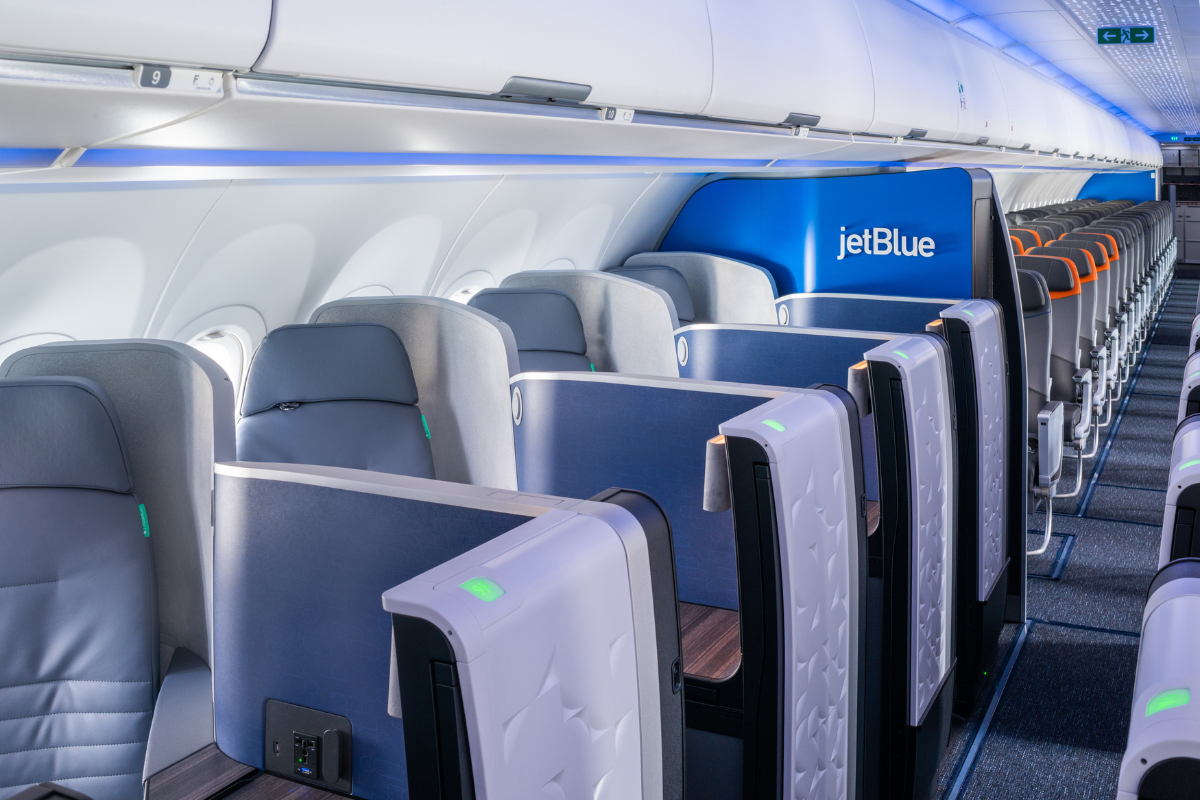
JetBlue will stop its Mint passengers from using the personal privacy doors fitted to its newest Business Class suites because it doesn’t want to pay for an additional flight attendant required to lock them open during taxi, takeoff and landing.
The move results from a bizarre rule from the Federal Aviation Administration (FAA), which requires airlines with Business Class suites fitted with personal privacy doors to have an additional flight attendant on duty over and above the normal federally mandated minimum.
Ordinarily, airlines must have a flight attendant onboard for every 50 passengers or part thereof. For example, JetBlue’s fleet of A321neo aircraft has 200 passenger seats fitted, so the minimum number of flight attendants required on this aircraft is four.
And JetBlue’s A321neos that are fitted out with the airline’s highly-regarded Mint Business Class suite usually require four flight attendants for the 160 seats installed on one variant and three flight attendants for the Long Range variant which has 138 seats installed.
But as flagged by Seth Miller, both variants of the A321neo with Mint suites have had one extra flight attendant working on them since March due to an FAA rule that concluded the extra workload required to lock and unlock the personal privacy doors was too much for just the minimum required number of crew.
As a result, JetBlue has been required to roster an additional flight attendant on these planes just to comply with the requirement of locking and unlocking the personal privacy doors in Mint.
To get around this requirement and reduce the number of flight attendants working on the variant with just 16 Mint suites, JetBlue has now decided to disable the doors, meaning that they’ll be permanently locked open.
Personal privacy doors in Business Class were first debuted by Delta Air Lines but became big news when Qatar Airways launched its much-touted QSuite Business Class product.
Since then, we’ve seen all sorts of airlines launch new Business Class seats which feature personal privacy doors. Sometimes, they’ve been viewed as a bit of a gimmick by some industry observers, but they’ve proved to be an important differentiator and are valued by passengers.
To get around obvious safety considerations, personal privacy doors are locked in the open position for taxi, takeoff and landing – a manual task that requires flight attendants to manipulate a special tool or switch and then verify that the door is, in fact, locked securely in place.
The process should be relatively quick and simple, although these doors can be pretty temperamental and sometimes require more time and effort to lock into position than the manufacturers originally envisioned.
According to research conducted by Seth Miller, the FAA originally planned to certify an exemption for personal privacy doors that wouldn’t require extra staffing levels before backtracking after they concluded the workload to lock the doors into place was “considered significant”.
JetBlue has complied with this rule since March but now plans to disable the personal privacy doors on affected aircraft by the end of August. At present, JetBlue has eight A321neos in its fleet with a 16-seater Mint cabin, which will require the personal privacy doors to be disabled.
Once the doors are disabled, Jetblue will immediately revert to minimum FAA crewing levels on these airplanes.
Related
Mateusz Maszczynski honed his skills as an international flight attendant at the most prominent airline in the Middle East and has been flying ever since... most recently for a well known European airline. Matt is passionate about the aviation industry and has become an expert in passenger experience and human-centric stories. Always keeping an ear close to the ground, Matt's industry insights, analysis and news coverage is frequently relied upon by some of the biggest names in journalism.








The rule is not bizarre; it is clearly spelled out in the regulatory exemption that allows doors to be installed on the planes.
Also, not all doors are being disabled. Only the 16J A321neo config will have that change as JetBlue does not want to roster five FAs on those planes where all the other A320-family configs take four.